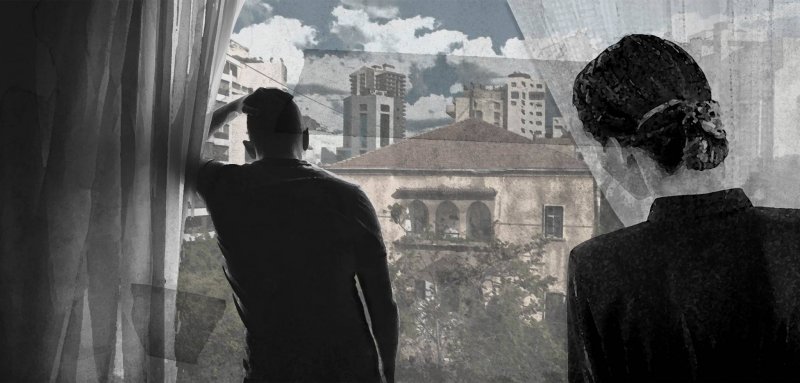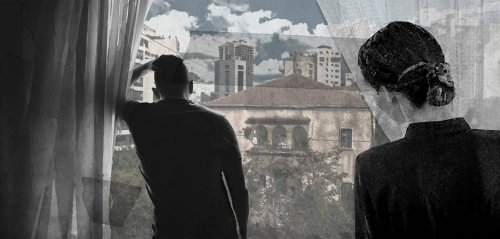This article was carried out within the “Youth22” project, a training program for Raseef22 sponsored by the D-Jil project made possible by a grant from the European Union supervised by CFI.
I leave the house. I bid everyone goodbye as if this is the last time, just in case it is. I spend my day in a state of constant vigilance, and then I go home and begin to recall the events of the day: Who did I come into contact with? How much did I spend? Can I afford these remaining weeks to reach the end of the month? Can I afford to go out with my friends tonight?...
It’s a daily checklist that you must go through if you live in Lebanon. You might stop and think for a second, “Maybe it’d be better not to go out today,” or you might reply to an invitation for coffee with an old friend with the excuse that you are “too busy”, in an effort to escape every attempt at having a good time.
You may give in to the insistence of those around you and finally agree to brave a night out in a place that isn’t too crowded. But when you see the price list there, you won’t be able to stop yourself from counting how many pills you could have bought for your unemployed cousin with the price of the beer bottle you just drank. You won’t be able to stop yourself from thinking about the gasoline you spent to reach the bar, and how you could have saved it for an emergency.
You might also dare to upload a photo to Facebook suggesting an air of happiness, and then, to make matters worse, you’ll receive negative comments doubting how affected you are by the situation, or how much you feel and sympathize with those who are suffering around you...
My grandmother would often worry at the end of our fun evenings about the “evils” that might come after all the laughs we had (a superstition that bad news comes following too much joy and laughter), and I would always argue with her about how ominous her words are. Now, they come to mind after every night out I have with friends.
After everything we witnessed last year as Lebanese people — from an explosion that every neighborhood had miraculously escaped from, to an economic collapse that spared only a few — maybe you’ve become like me, afraid of joy, afraid of expressing joy, and afraid of allowing yourselves to feel any joy.
The return of some semblance of the normal life we had before the lock down — from hook ups with friends to nights out and weekend plans — has intensified and made this feeling even more pronounced for many young people.
You might also dare to upload a photo to Facebook suggesting an air of happiness, and then, to make matters worse, you’ll receive negative comments for being insensitive to others’ misery
Maryam, an architecture student at the Lebanese University, tells Raseef22, “I stopped communicating with anyone, even on social media. I feel that any attempt to get out of this state of isolation will affect me negatively.”
The past year was difficult for the 23-year-old young lady, especially during her days at the Lebanese University — just a micro-reflection of the crises that Lebanon is going through.
Consecutive Trauma and its Relationship to Joy
“People emerging from collective crises, especially those that extend over years, have a complicated relationship with joy,” says Alaa Hijazi, a therapist and consultant specializing in psychological trauma.
She adds: “In the event of a series of traumas, the nervous system, in an attempt to adapt, begins anticipating them all the time. It settles into a state of alertness and anticipation, just waiting for the next trauma to arrive. This in turn heavily affects emotions such as feelings of happiness, comfort, contentment, and hope, as well as a person’s ability to communicate.”
In some cases, the reaction comes in reverse, according to Hijazi, as both the nervous system and emotion enter a state of numbness. The person will try to adapt so that he won’t feel any pain, fear or loss, and his attempt to automatically numb the painful emotions begins to affect other emotions. “It becomes difficult for a person to feel joy, enthusiasm, pleasure, and even security.”
With the successive crises that Lebanon went through, from the Covid-19 pandemic and the losses it left behind, the Port of Beirut explosion and the accompanying collective trauma, to the economic crisis that has pushed more than half of the people of Lebanon into poverty, Hijazi sees that there is a crucial aspect that must be taken into account when talking about the fear of joy; survivor’s complex, or the feeling of guilt that accompanies the survivors of a tragic event. “The feeling of guilt has an impact on joy, suppresses it, tries to stifle it, and only makes it come with heartbreak,” says Hijazi.
“I feel like I do not want to have fun, or show joy. On my birthday, for example, I did not want to celebrate anywhere. Even when I celebrated it with my friends, I didn’t want anyone to know about it,” says Ramzi.
The 22-year-old law student at the Lebanese University tells Raseef22 about his attempts to return to his previous nightlife which used to be an escape for him in the past. “I used to feel guilty whenever I went out and stayed up late in the places where hundreds of people were killed. Perhaps if we restore the rights of the port explosion martyrs, it might allow us to return to that life, but before that, it’s just not possible,” he says.
Can this Feeling be Overcome?
Hijazi likens this feeling to depression. A person believes that if he allows himself to anticipate something good, and then a new trauma takes place and pushes him back into the abyss, it will be as if he had fallen from the tenth floor. So things would be better if he just decided to remain as he is, on the ground floor.
A particularity of the Lebanese context, where a rhetoric that calls for recovery, revival and overcoming crises is often adopted before acknowledging and dealing with the tragedy itself, and also even before acknowledging the extent of the trauma
“But life, especially within a context like the one we live in, is an alternation between pain and joy, and a person has to allow himself to be happy knowing that it will not last,” says Hijazi.
Hijazi also points to some particularities in the Lebanese context, where a rhetoric that calls for recovery, revival and overcoming crises is often adopted before acknowledging and dealing with the tragedy itself, and also even before acknowledging the extent of the trauma. “We need a collective discourse that balances acknowledging the scale of the trauma, the collective pain, and making room for hope,” she says.
In a setting where crises continue to unfold one after the other, this topic takes on double significance. “I very much believe in the phenomenon of the inheritance of trauma. When it is not treated, when we do not call it by its name, or address its effects on us, and how it affects parents and the way they raise their children, it is passed on from generation to generation,” Hijazi says.
The traumas left over from the Lebanese civil war, consecutive Israeli attacks, and all the problems that have befallen the people of Lebanon in the past decades have not been addressed or treated, and their effects are accumulating on both the old and new generations.
But the new generations, especially young people in their twenties and thirties, have a growing awareness of mental health, according to Hijazi, starting from recognizing trauma and naming it as it is — which is the first step to overcoming it — to taking more practical steps towards treatment.
“One of the reasons why trauma is painful is that it breaks the existential framework, or breaks the meaning of life,” Hijazi says in conclusion, “For our survival, we must create meaningful moments, even if they are short or scattered, in order to carry on in life and preserve our right to it.”
Raseef22 is a not for profit entity. Our focus is on quality journalism. Every contribution to the NasRaseef membership goes directly towards journalism production. We stand independent, not accepting corporate sponsorships, sponsored content or political funding.
Support our mission to keep Raseef22 available to all readers by clicking here!
Interested in writing with us? Check our pitch process here!






